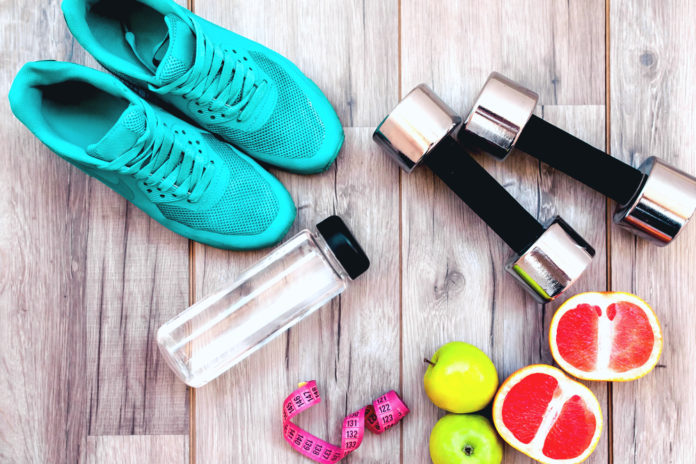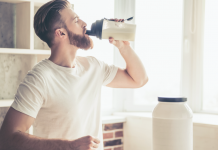Looking for the fastest way to get in shape? If fitness comes to mind first, that is similar to the majority of the population!
However, being “fit” embodies holistic health and involves many lifestyle factors. While exercise is one piece of the puzzle, many other lifestyle factors contribute towards getting fit fast equally as much, if not moreso.
In the following list, after number one, the rest follow in no particular order. The first recommendation listed is by far the most important practice to adopt if trying to get fit fast (and live the longest life possible)!
If finding yourself intrigued, read on to get fit fast and reach long-term fitness goals!
5 Steps to Get Fit Fast
Getting fit fast involves a comprehensive approach even beyond the gym. Find out the fastest way to get in shape (and stay in shape) no matter the fitness level!
1. Eat Mostly Whole Foods
Truly, eating mostly whole foods that originate from earth is the simplest, quickest, most effective method to achieve optimal health. Hands down.
In general, whole foods provide the following “super powers”:
- Antioxidants that fight off free radicals
- Purest forms of vitamins and minerals
- Least amount of preservatives, additives, hormones
- Help balance blood sugar well
- Reduce risk of every chronic and autoimmune disease
- Easily digested and absorbed
Examples of whole foods include:
- Fruits and non-starchy vegetables
- Starchy vegetables (roots, potatoes, winter squashes, etc.)
- Whole grains
- Unrefined oils
- Nuts and seeds
- Beans, lentils, and legumes
Eating plenty of plant foods that are unprocessed and unrefined is truly the single most effective method to get fit fast. Their effect on metabolism and overall bodily health is unmatchable.
And great news! This is in addition to living with moderation of soul-giving activities such as:
- Dining out at a restaurant or ordering takout
- Missing a workout every once in a while
- Eating a little too much ice cream as a midnight snack with a long friend
- Partaking in any other enjoyable, fun activity
Overall, perfection is not the goal. More often than not is plenty sufficient!
2. Prioritize Resistance Strength Training
In addition to eating healthy, building and preserving muscle mass is key for nourishing metabolism function. Thus, sustaining muscle mass is strongly linked to living the healthiest life possible for the longest amount of time possible.
Include weight and strength training at least twice a week and focus on the major muscle groups, including the back, chest, arms, and legs. As a general reference, complete two or three sets of eight to 12 repetitions.
If new to weight lifting, consider consulting with a personal trainer for guidance. They can help tailor a personal plan, demonstrate good form, and ensure overall safety and effectiveness.
Consider HIIT, Too
(Eventually link when piece is created) Lacking the time to hit the gym and lift weights? Consider high-intensity interval training (HIIT) for a quick, whole body workout in just about 10 to 20 minutes! HIIT is a training method that alternates between high-intensity exercises and intervals with active rest periods. An example circuit may be completing a series of 10 exercises for 30 seconds then resting for 30 seconds.
Overall, HIIT elevates heart rate, helps build muscle of the lower and upper body, and burns more calories even post-workout. This style of training can be used in everyone’s fitness arsenal for benefits of short and long-term weight loss.
3. Drink Plenty of Hydrating Fluid
Remaining adequately hydrated is one of the most underrated health practices. Water hydrates our cells and provides an optimal environment for every single bodily function. (And the effects of not drinking enough water are less to be desired!)
In general, 0.5 to 1 ounce of water per pound of body weight is sufficient. For example, someone weighing 130 pounds should aim to drink 65 to 130 ounces of water per day.
Drinking enough water every day is also less daunting than previously believed! Ways to ensure adequate hydration include:
- Drinking a glass of water before and with meals and snacks.
- Keeping water conveniently on hand
- Using a large water bottle and filling it at least two to three times per day
- Infusing water to shake up the flavor
Eating nutrient-dense, high-water foods can also count towards daily hydration. These include cucumber, watermelon, broths, soups, and smoothies.
4. Focus on Non-Exercise Physical Activity
Remaining generally active throughout the day qualifies as non-exercise physical activity. It contributes towards health equally as much as regimented exercise.
Non-exercise ways to keep active include:
- Engaging in household chores
- Walking around the house, yard, or block
- Gardening
- Walking a pet
Health permitting, aiming to be active for two to three hours a day including any regimented exercise provides substantial health benefits. If regimented exercise feels unattainable, obtaining 2 to 3 hours of general activity/movement will lend equal benefit.
5. Sleep Sufficiently Enough
Humans tend to underestimate the tremendous power of sleep and what it can for health. Sleeping sufficiently and deeply enough can help people get in shape fast, lose weight, enhance cognition, amongst the other benefits.
For most, such benefits equate with 7 to 9 hours of deep, uninterrupted sleep most nights. If struggling to sleep, try exercising and practicing yoga. Limiting blue light, caffeine, and large meals at the latter half of the day can also help. However, seek out professional guidance if experiencing poor sleep and insomnia that does not subside.
Conclusion
Being truly “fit” encompasses much more than the perfect exercise routine. In fact, eating plenty of colorful, diverse whole foods provides the greatest benefit towards optimal health!
But, other factors like incorporating strength training, squeezing in daily movement each day, sleeping well and long enough, and drinking enough hydrating fluid matter nearly as much.
Best of all, the above listed health practices are minimal cost, natural, and synergistically beneficial!









